
![]()
Chronology
Introduction
1842: preparations
1843: the first visit
1845: the Beethoven celebrations in Bonn
1847: the second visit
After 1847
Berlioz and Berlin
Berlioz and the Prussian court
Berlin in pictures:
General view of Berlin
Berlin Opera House
Sans-Souci: palaces and gardens
This page is also available in French
![]()
May-July: Berlioz contributes reviews and articles to the Berliner Allgemeine Musikalische Zeitung
December: plans for a visit to Berlin by Berlioz and Harriet Smithson fall through
8 December: Berlioz meets Alexander von Humboldt in Paris
ca. 25 March:Berlioz travels from Hamburg to Berlin
8 April: first concert in the Opera theatre
18 April: concert with Marie Recio in the Russia Hotel
23 April:second concert in the Opera theatre
26 April: Berlioz leaves Berlin
8 October: publication in the Journal des Débats of the 7th Letter of the Musical travels in Germany (Berlin)
21 October: publication in the Journal des Débats of the 8th Letter of the Musical travels in Germany (Berlin)
8 November: publication in the Journal des Débats of the 9th Letter of the Musical travels in Germany (Berlin)
December: publication of the Treatise on Orchestration, dedicated to the King of Prussia
13 August: Berlioz is invited by the King of Prussia to a concert at his Brühl castle near Bonn
18-20 February: Berlioz stops in Berlin on his way to Russia; the King of Prussia sends a letter of introduction for him to his sister the Tsarina
ca. 4 June: Berlioz arrives in Berlin coming from Riga
19 June: performance of the complete Damnation of Faust in the Opera theatre
21 June: Berlioz is invited by the King of Prussia to his palace at Sans Souci
25 June: Berlioz leaves Berlin for Paris via Cologne
8 April: the Queen (formerly Princess) of Prussia attends a gala performance of Beatrice and Benedict in Weimar
14 & 18 August: the Queen of Prussia attends performances of Beatrice and Benedict in Baden-Baden
14-15 November: Berlioz stops in Berlin on his way to St Petersburg
![]()
Notes
![]() In Correspondance
Générale no. 822 of 15 March (hereafter CG for short) Berlioz stated that he would be in Berlin on the 24th, though he may have been delayed. CG
no. 823bis [in vol. VIII], written in Berlin, is given the date 24 March by the editor, but this cannot be correct: (1) CG nos. 823ter and 824, both written in Berlin on 30 March, imply that Berlioz had recently arrived from Hamburg (where the concert had taken place on 22 March); (2) CG no. 823bis refers to the King’s enthusiasm for the second movement of Romeo, but this was only performed at Berlioz’s second concert on (probably) 23 April. This letter may therefore have been dated a month too early and should date from 24 April.
In Correspondance
Générale no. 822 of 15 March (hereafter CG for short) Berlioz stated that he would be in Berlin on the 24th, though he may have been delayed. CG
no. 823bis [in vol. VIII], written in Berlin, is given the date 24 March by the editor, but this cannot be correct: (1) CG nos. 823ter and 824, both written in Berlin on 30 March, imply that Berlioz had recently arrived from Hamburg (where the concert had taken place on 22 March); (2) CG no. 823bis refers to the King’s enthusiasm for the second movement of Romeo, but this was only performed at Berlioz’s second concert on (probably) 23 April. This letter may therefore have been dated a month too early and should date from 24 April. ![]()
![]()
![]() CG no. 827 of 9 April states that the second concert would take place on 15 April; on the other hand CG no. 830 of 24 April and CG no. 831 of 27 April both imply that the 2nd concert was of very recent date.
CG no. 827 of 9 April states that the second concert would take place on 15 April; on the other hand CG no. 830 of 24 April and CG no. 831 of 27 April both imply that the 2nd concert was of very recent date. ![]()
![]()
There are few if any capital cities which can boast of harmonic treasures comparable to those of Berlin. Music is in the air, you breathe it, it penetrates you. Music is to be found in theatres, churches, at concerts, in the streets, in public gardens, everywhere. […] The reason is that music in Berlin is honoured by all. Rich and poor, the clergy and the army, professional and amateur musicians, the people and the king, all feel equal veneration for it. The king in particular brings to its cultivation the genuine fervour which animates him for the cult of sciences and the other arts, and that is saying a great deal. […]
Berlioz, Memoirs, Travels to Germany I, Letter 9 (in 1843)
Berlin was Berlioz’s destination of choice from the moment he first considered travelling to Germany, and Berlin probably caught his attention early in his student days in Paris: Spontini, one of his idols, had settled in the Prussian capital in 1820 as musical director of the Berlin Opera under the Prussian king Friedrich Wilhelm III (1770-1840), a position which he continued to hold under his successor Friedrich Wilhelm IV (1795-1861) until 1841 (though the king allowed him to reside in Paris). In the late 1820s further links with Berlin developed. In a letter to his mother dated 10 May 1829 Berlioz writes (CG no. 125):
[…] The owner of the Berliner Allgemeine Musikalische Zeitung [Berlin Musical Gazette] recently came to ask me to be the correspondent in France of his paper; I will be reviewing musical events in Paris, my articles will be translated in German, and every six months I will be paid 25 fr. for every printed page. A page comprises 16 small columns, so that is not paid very much, but it can be very useful in making me somewhat better known in Prussia. […]
To his friend Humbert Ferrand Berlioz writes a few weeks later (CG no. 126, 3 June):
[…] I am being harassed for newspaper articles. I have the job of correspondent for the Berliner Allgemeine Musikalische Zeitung, for virtually nothing. I am translated in German; the owner is in Paris at the moment, and he is bothering me. […]
Berlioz contributed a number of articles to the journal, which appeared in German translation between May and July 1829 (they are reproduced, with a reconstructed French translation, in Critique musicale I pp. 17-45 – the originals are lost). The director of the Berlin journal, not named in the composer’s correspondence, was Adolph Marx (1795-1886). Marx is actually named by Berlioz in his Memoirs, in a different though evidently related context. In 1828 Berlioz had discovered Goethe’s Faust in the French translation by Gérard de Nerval, and as he relates in the Memoirs (chapter 26):
The wonderful book fascinated me from the outset; I could not put it down; I read it constantly, at table, at the theatre, in the streets, everywhere.
This prose translation comprised a few passages in verse – songs, hymns, etc. I yielded to the temptation of setting them to music, and hardly had this difficult task been completed, and without having heard a note of my score, I was foolish enough to have it engraved… at my own expense. A few copies of this work, published in Paris under the title: Eight Scenes from Faust, circulated in this way. One copy came into the hands of M. Marx, the celebrated critic and theorist in Berlin, who was kind enough to write to me a sympathetic letter on the subject. As you can imagine, this encouragement, undreamed of and coming from Germany, caused me great pleasure. […]
A letter of Berlioz to his father refers to this (CG no. 145, 3 December 1829):
[…] I received a week ago, through Schlesinger the music dealer, an issue of the Berliner Allgemeine Musikalische Zeitung in which there is a long analysis of my score of Faust. This was translated to me verbally, and the article is full of praise for my work. If you would like to see it, I will send you a version in French. It is very striking. It is by M. Marx, from whom I received last month a letter written in very peculiar French. […]
Maurice Schlesinger, the music publisher whose shop was located at 97 rue de Richelieu, had a brother Heinrich in Berlin, who was also active in the music business: Berlioz was to correspond with him later (cf. CG nos. 1110bis, 2064).
In July of the following year (1830) Berlioz won the Prix de Rome competition after several attempts. The rules required that the successful candidate spend a period of study in Italy and in Germany. In the early months of 1832, while still in Italy, Berlioz mentioned to a number of correspondents his intention to travel to Berlin as soon as possible after returning to Paris (CG nos. 256, 258, 272, 276, 282). On 29 March, for example, writing from Rome to Spontini he complains of the disappointing state of music in Italy (CG no. 268 [full text in vol. VIII]):
[…] Where are the scores of La Vestale, Cortez, e tante altre divine sorelle [and so many other divine sisters], their noble accents, their passionate impulses, their queenly demeanour? Where are the sublime choruses and the fiery orchestra which have so often stirred my whole being?… In Berlin, in Berlin I will find again all the objects of my adoration, all my idols, in even more splendid attire than in Paris. It is in Berlin that at last I will be able to quench fully the thirst for true beauty which consumes me and which the Italian sun merely exasperates! […]
Berlioz’s travel plans were unexpectedly put on hold after his return to Paris in November of the same year – Harriet Smithson happened to be in Paris at the time and Berlioz’s feelings for her flared up all over again. After a stormy courtship they were married on 3 October 1833. But Berlioz’s thoughts soon turned back to Berlin; while still on his honeymoon in Vincennes he wrote to his sister Adèle (CG no. 347, 6 October):
[…] In a month or two I will perhaps be going to Lyon to give a huge concert; Harriet will accompany me, and this winter we shall both travel to Prussia where my pension obliges me to go and where my wife has just been offered a fairly lucrative contract to perform English tragedy. […]
A few days later, still in Vincennes, he wrote to Humbert Ferrand (CG no. 351, 11 October):
[…] This winter we shall be leaving together for Berlin, where my musical commitments summon me; an English theatre is going to be set up there and for this offers have been made to Harriet.
Will Spontini be prepared to help us, or at least not to stand in our way? I do hope so. […]
With this in mind, and remembering Spontini’s favourable reaction to the first performance of the Symphonie Fantastique at the Conservatoire on 5 December 1830 (cf. CG no. 191), Berlioz wrote to him in Berlin to seek his support (CG no. 364, 7 December 1832):
The flattering signs of interest and friendship which I received from you during your last trip to France [in December 1830] encourage me to approach you directly for a signal favour; the influence you so deservedly enjoy with the King of Prussia puts you in a position to bestow it. […] I am obliged by the regulations of the Institute to travel to Germany next year; the choice of capital city can be in no doubt: Berlin has to be my destination, since you preside there in person over the destinies of the art of music. Therefore, since it is of the greatest importance to me that my wife’s wonderful talent should be manifested in all its glory to the Berlin public, and given that a company of English actors, under the direction of M. Livius, is at the moment touring Germany, I would dare to hope that you would be so obliging as to extend to both of us your support on this occasion. […]
Spontini’s response, if any, was evidently disappointing, as shown by a letter to Adèle on 26 December (CG no. 370):
[…] We are not going to Prussia; the plan we were counting on has not come off, and we are staying in Paris where I can see that my career is taking shape day by day. […]
It would be years before Berlin appeared again on Berlioz’s horizon. As for Harriet Smithson, she never performed abroad after her marriage. Later she actively opposed Berlioz’s plans to travel abroad to propagate his music.
During the mid- and late 1830s Berlioz’s reputation in Germany was gradually spreading. In March 1838 the composer was approached by Ludwig Rellstab (1799-1860), a noted writer and musicologist in Berlin (Schubert had set some of his poems to music, as did Liszt later). On this occasion Rellstab was asking for general information about Berlioz, who responded at length. Warning Rellstab against the entry in the Biographie Universelle by Fétis he referred him to a book by his friend Joseph d’Ortigue, to which he added extensive details about his musical ideas, tastes, compositions, and work as a music critic. He concluded (CG no. 549, 31 March):
[…] I thank you, Sir, for your friendly suggestion to have my orchestral music performed in Berlin. The only work whose publication I have sanctioned is the overture to the Francs-Juges, composed some fifteen years ago; my aim has been to avoid being exhibited in public in places of ill-repute where certain speculators drag willy-nilly composers whose works are in the public domain. This overture has already been performed in Weimar, Leipzig, Aachen, and Vienna, and I would be very flattered if it was to be welcomed in Berlin. It is quite a difficult piece, but Prussian orchestras are very capable and I have no doubt that thanks to your care it would be properly performed. I am happy, Sir, to have had in this way the benefit of establishing relations which if you wish could become closer and which will be for me, I can assure you, as flattering as they are pleasant. […]
In the event Berlioz’s hopes on this score were to be disappointed. Rellstab did indeed publish a biographical notice on Berlioz (cf. CG no. 811, 2 February 1843), but on the occasion of Berlioz’s visit in 1847 though outwardly polite he reviewed the Damnation of Faust in the most scathing terms. Berlioz could console himself with the thought that he was in good company: Rellstab had been no less critical of the two musical directors of the Berlin opera, first Spontini and after him Meyerbeer (cf. CG no. 660, 6 August 1839).
![]()
Berlioz’s Memoirs (chapter 51) gives little information about how he prepared for his German tour of 1842-1843, beyond mentioning the exploratory visit he made to Brussels in September and October 1842. The composer’s correspondence adds some detail but is not very extensive for this period.
Two significant developments took place in 1842. The first was that Spontini’s place as artistic director of the Berlin Opera was taken over by Meyerbeer who remained in charge till 1848 (Berlioz’s reports on his visit in 1843 have noticeably very little to say about Spontini). Berlioz had known Meyerbeer for several years already in Paris and judged that Meyerbeer’s new position in Berlin and his prestige on the European musical scene would be an asset to him in his German enterprise. Various allusions in Berlioz’s correspondence show that he had hoped to persuade Meyerbeer to attend his Brussels concerts in the autumn, though without success (CG nos. 772bis, 776); that Meyerbeer had sent letters in advance to Frankfurt to announce Berlioz’s arrival following his concerts in Brussels, though unfortunately these letters had gone astray (CG no. 784); and that as well as the help he provided in Berlin he also assisted Berlioz in other cities (Munich: CG no. 795 [cf. David Cairns, Berlioz vol. 2 (1999), p. 269]; Dresden: CG no. 807).
The second development was the completion in the summer of 1842 of the Treatise on Orchestration (Grand Traité d’Instrumentation et d’Orchestration Modernes) which Berlioz had developed in book form from a series of articles published in the Revue et Gazette Musicale between November 1841 and July 1842 (Critique musicale IV pp. 555-60, 567-85, 603-7; V pp. 1-15, 19-21, 51-62, 101-4, 136-52, 159-84). As he writes to his brother-in-law Marc Suat on 10 August (CG no. 772):
[…] You ask me, my dear Suat, what I am doing. In truth I am working very hard. I am putting in order and completing at this moment a large Treatise on Orchestration, for which I hope to be decently paid. This work should fill a gap in musical education, and I have been urged from many quarters to undertake it. My articles in the Gazette Musicale only provided the surface and essentials; now all this has to be reworked and all the most minute technical details attended to. […]
The money would be needed to finance the German trip. On 9 December, writing to his sister Nancy on the eve of his departure, he mentions his hopes for the publication of the Treatise in France and abroad, including Germany (CG no. 791; cf. 775 for Russia):
[…] Before departing I wanted to complete my large work on orchestration. This is now done and it has been sold. The Paris publisher has bought it for 5000 francs, half of which to be paid today and the other half when it is put on sale in eight months if we can reach a specified number of subscribers (200). I will then have to get paid by the English, Italian and German publishers; I have not yet sold the publication rights for Germany, and I hope to complete this deal while on my way through Mainz. […]
The trip to Germany also had a wider practical purpose: Berlioz had received a commission from the Ministry of the Interior to study the musical institutions of Germany, hence the particular attention to the instrumental and vocal resources of the cities he visited in many of the letters which he published about his travels later in 1843.
The same letter then adds an interesting item of information:
[…] I met yesterday M. von Humboldt who is leaving for Berlin in three weeks, where he will talk about me in the King’s council chamber. He is a personal adviser of the King; everybody is an adviser in that country. […]
Humboldt was none other than the celebrated naturalist and explorer Alexander von Humboldt (1769-1859), ‘this dazzling example of scientific writing, this great anatomist of the terrestrial globe’ as Berlioz later described him. Humboldt had recently become closely attached to the court of King Friedrich Wilhelm IV of Prussia on his accession in 1840. Berlioz’s regard for him went back to his youth and his passion for geography and foreign lands which he mentions in the Memoirs (chapters 2, 12), a passion stimulated by reading all the books he could find in his father’s library. According to David Cairns (Berlioz II [1999], p. 269) one of these books was Humboldt’s Tableaux de la Nature of 1808 (cf. CG no. 1279). Cairns also states that it was Meyerbeer who introduced Berlioz to Humboldt in December 1842 (Meyerbeer himself had enjoyed the support of Humboldt for his appointment as artistic director of the Berlin Opera). Humboldt provided Berlioz with a letter of introduction to the Prussian King (CG no. 791quater [in vol. VIII]). It may also have been Humboldt who suggested to Berlioz that he dedicate his treatise on orchestration to the King of Prussia (H. Macdonald, Berlioz’s Orchestration Treatise [2002], p. xix).
Berlin will thus have loomed large in Berlioz’s mind at the start of his trip. On 24 November he had written to his sister Adèle ‘I have just made a small musical excursion to Belgium and Frankfurt, and I am ready to return. But this time it will be for a longer period, I must undertake the grand tour and see Vienna and Berlin’ (CG no. 789).
![]()
In the event the visit to Berlin was delayed. On 5 January 1843 Berlioz wrote to Meyerbeer in Berlin about his plans (CG no. 798); Meyerbeer responded and later in the month Berlioz was expecting to give two concerts in Berlin in March (CG no. 803, 23 January; cf. 815, 18 February). But on 28 February, while in Leipzig, he was informed by Meyerbeer that the concerts had to be put off because of festivities at the Prussian court (CG no. 816). He went to Brunswick instead (cf. CG no. 817), from where on 14 March he wrote to his father (CG no. 820):
[…] Tomorrow I am off to Hamburg where I am expected, and from there I will go to Berlin where two concerts are announced, for which I will not have to pay anything and half of the gross receipts are guaranteed. This will be a very important trip, I will be seeing the King of Prussia to offer him the dedication of my Treatise on Orchestration. M. von Humboldt will introduce me. But these are going to be concerts on a vast scale, and I dread the fatigue. […]
While still in Brunswick Berlioz was in correspondence with the Berlin publisher Heinrich Schlesinger (brother of Maurice in Paris) about music that was to be used for his concerts (CG no. 822, 15 March). In Hamburg he received a letter from Meyerbeer concerning the preparations that were in hand in Berlin (CG no. 823).
Berlioz arrived in Berlin coming from Hamburg in the last week of March (the exact date is not known), and stayed for nearly a month till 26 April. He resided at the St Petersburg Hotel, the location of which is apparently unknown (CG no. 829). The fullest account of his time in Berlin is that of the Memoirs, based on the letters he published about his German travels in the Journal des Débats; those on Berlin appeared on 8 October, 21 October, and 8 November 1843 (Critique musicale V pp. 329-37, 347-57, 359-71). The version in the Memoirs reproduces them substantially as originally published, except for a few minor cuts. Appropriately Berlin was given the royal treatment, with no less than 3 letters devoted to the Prussian capital (Letters 7-9), while all the other cities received no more than a single letter each. The first letter described in detail the instrumental and vocal resources of the Berlin Opera as compared with Paris: more often than not the comparison was not to Paris’ advantage, especially as regards the chorus. The second reviewed performances of two operas given under the direction of Meyerbeer: Meyerbeer’s Les Huguenots and Gluck’s Armide (sung in German translation, as was the norm for vocal works in Germany; cf. CG no. 2273). The third letter completed the description of Berlin’s lavish resources: the Academy of song in a performance of Bach’s St Matthew Passion, the numerous brass bands, the royal court and the special interest in music shown by the king himself and the princess of Prussia (wife of the king’s brother). At the end of the letter Berlioz gave an account of the two concerts he gave in the Opera house, on 8 and (probably) 23 April.
Few of Berlioz’s letters survive from the time of his stay in Berlin, and they give only incidental glimpses of his experiences there. On 30 March Berlioz wrote to his uncle Félix Marmion (CG no. 823ter [in vol. VIII]):
[…] One of these days I am going to have an audience with the King of Prussia to whom I want to dedicate my Treatise on Orchestration which is being published in Paris at the moment. Everyone, and Meyerbeer at their head, has welcomed me in the most attentive and friendly way; but I have in front of me two hundred savages who need to be civilised, in other words I have two hundred new musicians to instruct and this makes me sweat in advance. […]
On 3 April Berlioz wrote a letter of recommendation for the harp player Parish-Alvars to J.-B. Chélard in Weimar. ‘I am in the midst of my rehearsals, and very preoccupied with having to instruct all these people’, he writes (CG no. 826). The next preserved letter, to Ferdinand Friedland in Breslau, dates from 9 April, the day after the first concert, and briefly alludes to it: ‘I am giving my second concert here next Saturday (15); the first took place yesterday and was a great success’ (CG no. 827; on the date of the second concert see the note above). On 24 April, just after the second concert, he wrote a letter to thank the musicians (CG no. 830):
[…] Before departing I cannot resist the need to express to you my gratitude for the welcome I received from you. Despite the burden of work under which you are labouring, you have nevertheless brought every imaginable dedication and patience to the study of my compositions, and you have performed them with an intelligence and verve that are above all praise. Be assured, gentlemen, that I shall never forget what I owe to you and that I take away with me the keenest admiration for your talents. […]
On 27 April after leaving Berlin he paused in Magdeburg on his way to Hanover, and wrote again to J.-B. Chélard in Weimar (CG no. 831):
[…] I have just finished my concerts in Berlin, where I was fortunate to be very successful. The King, the entire Court, and the Princess of Prussia received me in the most lavish manner. I am now off to give a concert in Hanover where I will be till 6 May, after which I will be returning to Paris via Weimar. […]
Berlioz goes on to suggest a possible concert in Weimar (which did not materialise):
[…] I would have a very interesting programme to offer you, especially if M. Genast was kind enough to sing (in German) my cantata Le Cinq Mai which was such a success in Dresden, Hamburg and Berlin. We will perform three pieces from Romeo and Juliet, among them the Queen Mab Scherzo, which so astonished the Princess of Prussia that I had to explain to her how such unusual sounds are produced and what is going on in the orchestra. […]
On June 4 or 5, now back in Paris, Berlioz gave to his father a general account of his German experiences, including his reception at the Prussian court (CG no. 838):
[…] I experienced everywhere the courteous, devoted and touching attention of the musicians, and was welcomed by several rulers with the most flattering eagerness. The Prussian court, among others, showered on me every possible mark of favour. M. von Humboldt, who continues to scale with the same courage the Andean peaks of science, showed genuine interest for my artistic endeavours in Berlin. He is a wonderful and courteous old man, who looks so awkward in his courtier’s dress (he is personal adviser to the King and is required to wear the appropriate dress). […]
The correspondence does however provide one item of information that is almost completely missing in the Memoirs (save for one very oblique reference): the Memoirs studiously avoid any mention of Marie Recio’s part in Berlioz’s German concerts (the original version of the letter on Dresden in the Débats of 12 September 1843 mentioned her participation at a concert there, but the sentence was removed from the final version in the Memoirs). Extant is a letter dated 12 April to the pianist and composer Karl Taubert (1811-1891), who was assistant conductor and director of the Opera at the time (CG no. 829):
[…] I barely have the honour of being known to you and already I am asking you for a favour.
This is the situation: Melle Recio, a young singer recently arrived in Berlin, is giving a concert in the hall of the Russia Hotel on Tuesday 18 March; she would like to benefit from the support of your fine talent and is asking me to convey this request. Be good enough to play with Messrs Ganz a trio by Beethoven, and to accompany the vocal pieces among which is an aria composed by you which will be sung by M. Mantius [tenor at the Berlin Opera]. I shall be personally obliged to you for this favour. […]
The reference is to the Ganz brothers: the violinist Leopold Ganz (1820-1869), one of the leaders of the Opera’s orchestra (together with Ries), and Moritz Ganz (1806-1868), who led the cello section. They were members of a musical family which developed a connection with Berlioz: a third brother (Adolph Ganz, 1796-1870) played under Berlioz in his London concerts, and his grandson William published many years later (in 1950) a book about Berlioz in London.
The Memoirs tell at length of the difficulties Berlioz had with the rehearsals, both orchestra and chorus: at one point he was about to give up altogether and leave Berlin. In the end, with patience and determination, and the support provided by the orchestra’s leaders, both concerts were a magnificent success. The first included the overture Benvenuto Cellini, Harold in Italy (with Leopold Ganz as solo viola), Le Cinq Mai (with Boetticher as the excellent bass singer), Weber’s Invitation to the Dance in Berlioz’s orchestration, and the larger movements from the Requiem, including the Dies Irae and Tuba mirum, Lacrymosa, and Offertorium. Relying on Berlin’s lavish musical resources Berlioz had planned to include the Requiem months in advance (cf. CG no. 782, October 1842). The second concert repeated some of the items of the first (including the Cellini overture, cf. CG no. 2273), but included as novelties the King Lear overture and 5 orchestral movements from Romeo and Juliet (i.e. the orchestral introduction, second, third, fourth and sixth movements). On hearing that the movements from Romeo and Juliet were to be included the King made a point of returning specially to attend the concert. It will be noted that whereas Marie Recio had sung at many of Berlioz’s concerts in other German cities during the tour, she took no part in either of the two Berlin concerts, but sang instead in the separate concert in the Russia Hotel mentioned above.
A third concert, at an unspecified date, was put on by the Prince of Prussia, brother of the king, for a select audience which included Berlioz. It was performed by a vast military band under their conductor Wiprecht (320 players in all) and gave an impressive demonstration of the prowess of Berlin’s military bands. The programme included, to Berlioz’s surprise, an arrangement of his Francs-Juges overture, by now a well-known piece in Germany, and also pieces by Meyerbeer, Wiprecht, and a battle symphony by the recently appointed English ambassador to Berlin the Earl of Westmoreland (1784-1859). Berlioz had previously corresponded with him when he was Lord Burgersh (cf. CG no. 593, 5 December 1838), and was to meet him again later.
What struck Berlioz with Berlin, quite apart from its lavish musical resources, was the exceptionally cultured atmosphere of the royal court, as exemplified by the status enjoyed there by Alexander von Humboldt, by the fact that the king’s head chamberlain, Count von Redern, was himself an accomplished musician, but above all by the reigning King of Prussia himself, perhaps the most intellectually open-minded ruler of his time, as Berlioz indicates in relation to his musical tastes:
The King follows with a watchful eye all the movements and I might say the progressive leaps of the new art, without neglecting the preservation of the masterpieces of the old school. He has a prodigious memory, which is even a source of embarrassment to his librarians and musical directors when he asks them without warning for the performance of some fragments from the old masters which nobody knows any longer. Present or past, nothing escapes him; he must hear everything and examine everything. That is the explanation for the powerful attraction that Berlin exercises on great artists, for the extraordinary popularity of musical feeling in Prussia, and for the choral and instrumental institutions possessed by the capital city, which seemed to me so worthy of admiration.
Hardly less remarkable was the Princess of Prussia; Berlioz relates how in the interval of the concert put on by her husband:
[…] I had the honour of conversing for a few moments with the Princess of Prussia, whose approbation is so valuable in view of her exquisite taste and knowledge of musical composition. Besides, Her Royal Highness speaks the French language with a purity and elegance which greatly intimidated her interlocutor. I would love to be able to draw here a Shakespearean portrait of the Princess, or at least convey an impression of her gentle beauty; I would perhaps attempt this… if I were a great poet.
Coming near the end of his tour, the visit to Berlin marked, after Brunswick and Dresden, one of the high points in Berlioz’s German travels.
On his return to Paris Berlioz was able to repay some of the debts he had contracted during his stay. The treatise on orchestration appeared towards the end of the year, bearing as promised the dedication to the King of Prussia. On 23 December Berlioz sent copies of the work to Meyerbeer in Berlin (CG no. 873):
[…] Here is the copy destined for the Berlin Academy together with a covering letter. I am adding another one which I beg you to accept. In this I am acknowledging a debt, since your works have provided so many fine examples of which I have made use in all sorts of ways.
The copy for the King will be handed to you by M. Lard, who has taken charge of it. […]
On 5 January 1844 he wrote to his sister Nancy (CG no. 877):
[…] I have just sent to the King of Prussia my Treatise on Orchestration; let us see whether the King will spend a few diamonds. It is Meyerbeer who has taken the Treatise with him, and M. von Humboldt who will present it. […]
The King responded on March 23 with a personal letter to Berlioz (CG 891bis [vol. VIII]), as mentioned in a letter to Nancy (CG no. 902, 19 May):
[…] The King of Prussia has written to me; I received his letter yesterday, in which he announced the sending of a golden snuffbox and the Great Gold Medal for scientific achievement; he is thanking me in this way for having dedicated to him my Treatise on Orchestration. […]
Berlioz thus found himself in possession of an autograph letter addressed to him personally by one of the most eminent monarchs of Europe – a rarity, since kings normally delegated their correspondence to their subordinates (cf. e.g. CG nos. 991, 1106, 1108). It is interesting to note that on at least two occasions, in 1852 and 1854, autograph collectors in Paris wrote to Berlioz enquiring about his letter from the King of Prussia (CG nos. 1444bis [in vol. VIII] and 1759), though on both occasions Berlioz professed to be unable to find it; the truth is perhaps that Berlioz simply did not want to part with such a valuable demonstration of royal support. The letter is now in the Berlioz Museum at La Côte-Saint-André (see its image on this site).
![]()
In August 1845 Berlioz attended the celebrations in Bonn for the inauguration of Beethoven’s statue. Among all the numerous visitors who flocked to Bonn for the occasion was a large contingent from Berlin, several of whom Berlioz had seen again or met for the first time during his visit in 1843: among them the King and Queen of Prussia, the Prince and Princess of Prussia, Count von Redern, Alexander von Humboldt, the Earl of Westmoreland, Meyerbeer, Moritz Ganz the cellist, the tenor Mantius, the bass Boetticher and the critic Ludwig Rellstab.
The Prussian court took only a detached part in the official celebrations. The start of a long concert on the morning of 13 August was actually delayed to suit their convenience, and the King of Prussia rearranged the programme to make it shorter. ‘The King of Prussia is very good at drawing up programmes’, was Berlioz’s comment in his official report on the celebrations. The royals left after this, but only to get ready for another more exclusive concert organised by them at the castle of Brühl nearby, independently of the official Beethoven celebrations. Berlioz had received an invitation to this concert from Count von Redern on behalf of the King (CG no. 990, 12 August), then on the day of the concert one from Meyerbeer (CG no. 991, 13 August):
His Majesty the King has instructed me through Baron von Humboldt to let you know that you will be invited to attend the Court Concert which the King is giving this evening in his castle of Brühl. You will also be receiving during the day an official invitation from Count von Redern in which he will indicate the time this evening when you need to be in Brühl. […]
Berlioz’s official report gives a description of the glittering evening at the royal palace (first published in the Journal des Débats of 3 September 1845, later reproduced in the Soirées de l’orchestre). A letter to his sister Nancy nearly two weeks later gives a more personal view of the occasion (CG no. 992, 26 August):
[…] The King of Prussia was most gracious; he recognised me among the crowd of guests at Brühl castle. The Princess of Prussia spoke to me for a few moments, but without recognising me, which says little for the charm of my looks, as we had quite a long conversation in Berlin. What is amusing is that at the end of the evening she reproached Meyerbeer for not having introduced me to her. This unfortunate Highness was unaware of the advantage she had enjoyed of talking to me in person. […]
![]()
Berlioz’s second visit to Berlin in June 1847 was a by-product of his trip to Russia in the preceding months; the trip to Russia had itself a connection with Berlin. Writing to the violinist Ernst on 28 January (CG no. 1095) Berlioz implied that on his way to Russia he would be stopping in Berlin (at the Russia Hotel – Hôtel de Russie – where Marie Recio had taken part in a concert in April 1843, though this time Berlioz apparently travelled on his own). His intention was to ask the King of Prussia for a letter of introduction to his sister, the Tsarina: the King duly obliged, and this greatly facilitated Berlioz’s stay in Russia (Memoirs chapter 55; CG no. 1100). The first two parts of the Damnation of Faust, a work which had failed in Paris the previous December and left Berlioz deeply in debt – and thus impelled him to travel to Russia in winter to recoup his fortunes – scored a great success. News of this must have reached the ears of the Prussian King; while still in St Petersburg Berlioz wrote to his sister Adèle (CG no. 1106, 25 April/7 May):
[…] I am now heading for Berlin where you can write to me poste restante. A few days ago the King of Prussia intimated to me through his general manager that the Opera Theatre was at my disposal for a complete performance of Faust which he would like to hear. I will therefore take advantage of this latest kindness of the King. For all musicians he really is a model of a ruler; may God prevent the rabble of Deputies he has been lumbered with from turning him, like our own king, into a Constitutional Monarch.
Two days later Berlioz, evidently affected by his brief idyll with a Russian chorister, wrote to Liszt (CG no. 1108):
[…] And now the King of Prussia has just made Count von Redern write to me that the Berlin Opera is at my disposal to perform Faust complete; so I am going to Prussia. But my heart is not in the task… Will I pick up the energy? Come, I am now falling back into self-pity! What a shame to be so overcharged and hypersensitive!… […]
About ten days later, still in St Petersburg, he started preparing the ground for his Berlin visit and wrote to Heinrich Schlesinger the publisher (CG no. 1110bis [in vol. VIII], ca. 8/20 May):
[…] I will be arriving in Berlin in about two weeks; I still have a concert to give in Riga on the way and then I shall be seeing you in Berlin. Will you be so kind as to have my arrival announced in the Berlin papers, and hint at the possibility that I will be putting on in your city my latest work The Damnation of Faust, which has scored here an even more furious success than in Paris? Count von Redern did me the honour of writing that the King of Prussia had given instructions to M. von Küstner the manager to make the great theatre available to me to perform this work. […]
A few weeks ago I wrote to M. von Küstner to ask him for his kind support, as though there was no order from the King; this is a word that should not be pronounced so as not to upset that autocrat. […]
Berlioz stopped in Riga in late May, then moved on to Berlin where he was from about 4-25 June; he stayed at the Northern Hotel, the location of which is not known (‘Hôtel du Nord’, CG no. 1115). The visits to Riga and Berlin are described in the Memoirs in the (unnumbered) chapter entitled ‘Sequel to the Russian trip’ (originally published in the Magasin des Demoiselles in 1855-56). But very detailed accounts of his experiences in Berlin are given in two letters he wrote after his concert on 19 June, which correspond in most details to the account in the Memoirs. It was for Berlioz an important occasion: the Damnation of Faust was receiving its first complete performance outside Paris, and its first airing in Germany.
To Auguste Morel on 20 June (CG no. 1114):
[…] I gave Faust yesterday; the performance by both orchestra and chorus was wonderful, especially the latter. Boetticher is an outstanding Mephistopheles, but the Faust [Krause] and the Marguerite [Brexendorf] were extremely weak. The Pandemonium chorus and the chorus in heaven, when performed with such verve by these bright and well-trained voices, are very different from what they must have seemed in Paris. The chorus of Sylphs sung in this way has a sonority which even the performances in St Petersburg had not allowed me to glimpse; it was encored as it always is, but as I failed to understand the words Da capo which they use here, instead of bis which can be distinguished above the shouts of bravo, I did not repeat the piece. I was told the Berliners were greatly upset by this. There was in the orchestra a group that was hostile because of some criticisms they claim I made in my letters about my first trip to Germany. This earned some of them a stiff fine, and all of them were read the riot act by the Manager, who on this occasion did his duty. None of this showed at the performance, and on the contrary the orchestra was wonderful. (Please keep quiet about this incident.) The King invited me to dinner at his palace of Sans Souci and we then had a long conversation together while walking through the gardens; I was the only musician at this gathering. The next day the Princess of Prussia had me invited to tea where this time I went with Meyerbeer, but as she wanted to talk to me at greater length this visit was followed by another one in very select company, where I had to tell her about my trip and give her all sorts of musical details. She took such a keen interest in Faust that despite the early morning start of the rehearsals she came to the last two.
The King sent his manager to compliment me until he could tell me in person how satisfied he was with this work.
But (between us) he played me a very bad trick by asking me, the day before the concert, to start at 6 o’clock, which had the inevitable result that the public, which previously had been told of a more convenient time, only started to arrive in part around the middle of the second act.
But how could I refuse? […]
To his sister Nancy on 22 June (CG no. 1115):
I have been here for about two weeks; I arrived just in time to put on Faust, as the theatre is closing at the end of the week. The performance was wonderful as far as the chorus and orchestra are concerned, but the singers!… there are really no singers left. I got half of the receipts after deduction of the expenses. Despite what I had been told on behalf of the King, the manager insisted on this deduction, and I had no intention of making a fuss about this penny-pinching with this King who has been so admirably good with me. He invited me to dinner at Sans Souci; I was the only musician at the gathering, and while the Queen and Prince of Prussia were talking to the guests under the orange trees, the King called for me. While walking in the garden we had a long conversation in which we both laughed in such a way as to attract the attention of the courtiers, who immediately came to have themselves introduced to me one after the other. Someone who causes the King to laugh and laughs with him!… It was extremely funny. I had many friends that day, and had not been counting on them. The Princess of Prussia had reproached me very graciously at dinner for not having come to see her yet; she invited me to tea in her rooms the following evening and to a very intimate conversation the day after, in which, like Othello, I had to recount my travels. She wanted to attend the two dress rehearsals of Faust. In short, and despite their anxieties over the political situation, the court has been exceedingly courteous as you can see. Meyerbeer continued to be very gracious and helpful, despite his domestic worries; his brother and mother-in-law are seriously ill, and his wife is obliged to take the waters to avoid falling in the same condition.
Lord Westmoreland, the Ambassador of England, a knowledgeable music-lover, is also charming, and we have known each other for a long time […]. Faust has made here a great impression on all musical classes of society. The day before yesterday Meyerbeer came to see me and met on the stairs the owner of the Northern Hotel where I am staying. This worthy music-lover stopped him on the way saying: « What a man this Berlioz is, M. Director General! And how ashamed I am of having given him a room on the third floor!… ». Now there is a compliment from a master… hotelier!
I was completely taken with the palace of Sans Souci and the surrounding gardens, and it is difficult to see anything more delightful. The inside of the palace, decorated by Frederick the Great, is certainly fine, but when you have arrived from Russia and seen the inside of the Winter Palace and especially the quarters of Grand-Duchess Mary, it looks incredibly flat and mean. M. von Humboldt, the agreeable and witty savant, whose fame you are aware of, welcomed me at Sans Souci as a close friend and adviser of the King. But while we were walking together in this beautiful park, the Journal des Débats was printing in Paris that M. von Humboldt is dangerously ill and that his life is a cause of the deepest concern.
You have to read our French newspapers away from Paris to appreciate fully what howlers they are fed about foreign countries. […]
On 24 June Berlioz wrote to Leopold Ganz, the leader of the orchestra, to express his thanks but also make a pointed reference to the passage in the VIIth Letter from Germany which had caused such unexpected offence to the Berlin flutes, who could not accept Berlioz’s verdict that their Paris colleagues were superior (CG no. 1116):
[…] I am leaving tomorrow, and since I was unable to say goodbye to you today I must write you a few lines to thank you personally, and to ask you to convey my thanks to the musicians of the royal chorus and orchestra for the wonderful way in which they performed my work The Damnation of Faust. Be kind enough to tell M. Essler how grateful I am to him for the trouble he has taken over the choruses, and that the result he obtained is the most satisfying that any composer could wish. I enclose with this letter a copy of my letters on Germany; you will be able to see and to point out to the gentlemen of the orchestra in what terms I have written about them, and whether the few remarks of detail that I made are such as to cause them offence and to be taken in a negative sense. […]
Back in Paris Berlioz wrote to his sister Nancy on 31 July (CG no. 1120):
[…] You know that the King of Prussia has decorated me with the order of the Red Eagle, 3rd class… This has caused a tremendous stir in Berlin, since this decoration is very rarely given, and always starts at the 4th class. […]
![]()
Berlioz and Berlin
The visit to Berlin in June 1847 was the last Berlioz was to make there (except for a brief stop in 1867). It will be noted that, despite the support and interest that the King of Prussia constantly showed him, at no point was there ever any talk of Berlioz being given a permanent post in the Prussian capital (unlike what happened to him in Vienna in 1846 and again in Dresden in 1854). It could be that the mild criticism he had made of the Berlin flute players in 1843 did unintentional but lasting damage: it is still mentioned by Berlioz as a sore point in October 1854 when he completed chapter 59 of the Memoirs. The performance of the complete Damnation of Faust in June 1847 also gave a foretaste of the animosity that would greet the work in some German circles: a French composer had dared to set to music the work of a German poet. It seems in fact that Berlioz lacked active supporters in Berlin beneath the level of the royal court: there was no Berlin equivalent, for example, to Robert Griepenkerl in Brunswick from 1843 onwards, or to Hans von Bülow in Dresden in 1853-1854. The local press seemed also generally unsympathetic. The writer and critic Ludwig Rellstab, who in 1838 had shown interest in the rising composer, responded in 1847 with outward politeness but critical rebuke in print of the Damnation of Faust (cf. also CG nos. 1704, 2065).
It is noticeable in this context that in the years 1852-1855, when Berlioz was in active demand in a number of cities in Germany, including cities he had not previously visited (Bremen, Gotha) and cities where planned visits failed in the end to materialise (Elberfeld, Oldenburg [CG nos. 1664, 1668, 1669, 1672, 1698, 1703, 1706], Munich), there appears to be no mention in the composer’s correspondence of any plans for a possible visit to Berlin.
In 1856 an opportunity seemed to arise. Hans von Bülow, a pupil of Liszt and devoted admirer of Berlioz (they first met in Weimar in November 1852), had taken up an appointment in Berlin from where he wrote to Berlioz in Weimar (CG no. 2098, 10 February):
[…] I am all the more disappointed not to be able to go to those fortunate little duchies of Saxony as there seems little likelihood of your coming soon to Berlin to triumph here as the admirers of your genius would like.
They may still be a small band, but they already add up to the shadow of a party, whose enthusiasm will I hope make up initially for their small numbers.
It is in the name of this gathering of young musicians who have formed themselves into a club that I will put a request to you.
One of the principal objectives of our society is to educate ourselves with the masterpieces of modern music. That is why we have resolved to acquire little by little, sharing the costs between us, your scores which are so difficult for the German public to get hold of. We would like to start with Faust. I have been asked to procure the full orchestral score. I venture to ask you, should the cost of this be very high, whether you might have the exceptional kindness of obtaining the score from your publisher at a more reasonable price, more in line with the modest means we have at the moment. We have fixed a sum of about 40 francs for this first expense.
It goes without saying that should you find my request too indiscreet, you will regard it as null and void. […]
It will be noted that Bülow and his friends never envisaged approaching the Prussian court for support, despite their known friendliness to Berlioz, nor did it occur to Berlioz to suggest this: the social gulf separating the monarchy was unbridgeable. Berlioz replied at length two days later (CG no. 2100):
First of all thank you for your charming and so cordial letter, which lifted my spirits. You write French with an elegance and purity that are a source of irritation to those of us who find it so difficult to navigate the pitfalls of this infernal language. […]
Please thank on my behalf the members of the musical Society you belong to for wanting to have my scores, and communicate to them the following answer:
Liszt is proposing to send them a copy of the full score of Faust as a present. When I return to Paris, I will promptly send you (or them) the full score of l’Enfance du Christ of which I have a few copies, as well as the full score of my new cantata with double chorus, l’Impériale, which we have recently performed several times at the concerts of the Exposition Universelle.
As my publishers are anything but accommodating, if your Society wishes to acquire one of the works which I am unable to give you, I would suggest the score of my Te Deum which has just been published (by Brandus & Co. in Paris). It will only cost you 40 francs if you place a subscription for it. Be assured that I shall seize every opportunity to help you to complete your collection at no expense to the Society, or at the lowest possible cost.
I would be very happy if you were able to organise, with the singers conducted by M. Stern, a performance in Berlin of this Te Deum. I would send you the choral parts as far in advance as possible. If you were to add to this work, which only lasts three quarters of an hour, another composition of similar length, we could give a grand concert, capable of attracting the attention of the public in Berlin. I do not know what arrangement would suit M. Stern to safeguard his interests in this small venture and cover my costs for travel and staying, should I be coming from Paris. Please look into this with him; any obstacles will not be from my side. Should we be able to organise the performance of this Te Deum, I believe the result would be beneficial and of great significance for the cause [sc. of contemporary music]. Everything depends on the choruses. The work contains only one solo (for tenor), which can if necessary be sung by a soprano. I imagine the Academy of Song has an organ, and as for the orchestra two rehearsals should be enough to get it ready under my direction.
The time is not ripe for attempting all this; we need to prepare for it some time in advance. Be kind enough to write to me here in Weimar, and tell me what you and M. Stern think of this project. […]
Nothing came of the plan to perform the Te Deum in Berlin.
Two years later, early in 1858, Bülow wrote again to Berlioz in Paris about a concert he had given in Berlin. Berlioz responded at length (CG no. 2273, 20 January; cf. no. 2279):
[…] So you have dared to undertake a series of concerts, and in Berlin at that! A city which is not of solid ice (a block of ice has its beauty, it shines and has character), but one which is thawing, cold and humid. And Lutherans at that!… people who never laugh, who are blond but without being gentle… You see how my mind wanders, I was once blond and am not gentle… You may laugh, you have my permission, it is all the same to me.
Your programme was very beautiful: you did me an insult in assuming that in your account of the outcome of this concert I would not be interested in anything except what happened to my two pieces. You said nothing to me about either your own Overture or the pieces by Liszt; you have slandered me. But I forgive you. Once again, it is all the same to me, except that I will not be credited with the music of the leaders of the Parisian school. This is not the first time (as you think) that the Berliners have had to put up with my overture to Cellini; they had to swallow it twice over, some fifteen or sixteen years ago [in 1843], at my concerts in the theatre. I also recall that our friend [Heinrich] Schlesinger, after the second hearing, came to me in astonishment to ask me whether this was beautiful… As I did not want to deceive him I said Yes. But he did not believe me. You say that the Lutheran critics have not savaged too much le Pâtre breton. They are decent people, after all, and when they hear the chord of E flat:
![]()
they fully agree that this chord, though written by me, has not become discordant. Our lunatic from the Revue des Deux Mondes [Pierre Scudo] does not have such integrity, and when he is played a chord of E flat written by me he declares it intolerable.
Please kiss the hand of Mlle Rosa von Milde when you see her, and thank her for her courage in singing the chord of E flat all the same.
The orchestral and choral parts of l’Impériale are at your disposal, and I will send them to you when you wish; only that I do not have the German translation of this cantata and I do not imagine that German choristers can be made to sing in French. How will you get around this difficulty? Please answer me on this point, after which I will do what you wish and will give you some directions on the performance of the piece.
I wish you every success in your devoted enterprise; but between us I shudder at the money it might cost you, unless your orchestra comes extremely cheap. Here such a fear would be unreasonable: there is nothing to fear, you are certain not to cover your costs.
I must tell you that Brandus has just published some sort of a new edition of Romeo and Juliet, in full score with separate parts, with a mass of corrections and a few small but rather important changes of detail. The vocal score has been established in accordance with these corrections, with German and French text, and will appear shortly in Leipzig. If you were ever inclined to perform some fragment from Romeo and Juliet at your concerts, do not do it without letting me know in advance; I will indicate to you the pieces where changes have been made. […]
It will be seen that in this letter Berlioz does not even raise the possibility of a visit by himself to Berlin. By this time the composition of the Trojans, the long struggle to get the work performed in Paris, and Berlioz’s own failing health, had as consequence a considerable reduction in the foreign tours he was able to make. Thereafter the relations with von Bülow that had started so well became increasingly distant, for reasons mentioned elsewhere on this site.
Berlioz and the Prussian court
On the other hand Berlioz never forgot the warm support he had received in Berlin from the Prussian court circles, as shown by occasional references in his correspondence. In January 1848 in London he contrasted the reception he received abroad with the indifference of the Paris public (CG no. 1162, to Auguste Morel):
[…] Have I ever seen at my concerts in Paris people from high society, men and women, moved as I have seen in Germany and Russia? Have I seen princes of noble lineage showing interest in my compositions to the point of getting up at 8 in the morning to come to a cold and dark room and hear them being rehearsed, as the Princess of Prussia did in Berlin?
On 1 September of the following year (1849) he writes to his sister Nancy (CG no. 1279):
[…] I have just treated myself to volume two of M. von Humboldt’s Cosmos, a magnificent work of which our poor father had Part One. It is a compelling and demanding read, of which I would say that it makes me lose a great deal of the time that I have gained. Volume three will soon be in the press in Germany, and the illustrious old man will thus have brought to completion the magnificent undertaking which he was so worried death would interrupt in mid course. The fact is that people sometimes die at precisely the moment when they are beginning to know something and are entering the age of true reason. […]
There is a sly allusion to Berlioz’s own reading of Humboldt’s work in the Soirées de l’orchestre, which was first published in 1852. In the Prologue, Berlioz comments on the opportunities for study presented to orchestral players by performances of bad operas: ‘I know one who during the first fifteen performances of a famous opera has read, re-read, pondered and understood the three volumes of Humboldt’s Cosmos’ (cf. also the beginning of the Sixth evening: one of the musicians ‘is constantly studying Humboldt’s Cosmos’).
The revolutions that had swept Europe in 1848 seriously threatened the stability of many of the monarchies of the time. Berlioz alludes to this in a letter to Nancy of December 1849 and volunteers a comment (CG no. 1285bis [in vol. VIII]):
[…] The King of Prussia is beginning to find his balance again. May God wish that he preserves it!… He is
The only King whose memory our art will preserve. […]
This was written before Berlioz had been able to appreciate the dedication to music of the King of Hanover and the Grand Duke of Weimar. But when Berlioz returned to Hanover in 1853 after a decade, he drew an appropriate comparison (CG no. 1644, 10 November): ‘You must know that the King of Hanover […] is in addition a very distinguished musician, and literate and cultured like the King of Prussia’.
In 1855 Berlioz published his Te Deum and a subscription was opened: Berlioz had his eye on the royal courts. In December he wrote to Heinrich Schlesinger in Berlin (CG no. 2064):
[…] Here is a letter for the King of Prussia which the Prussian Ambassador in Paris would not undertake to forward to Berlin. Please be more obliging than this great Diplomat, and do me the service of putting my letter in a fine envelope and getting it to the King in the manner you think best.
If asked about the price of the subscription for the work concerned you will know that it is 40 fr., neither more nor less; this should not ruin His Majesty if he only takes one copy. […]
The King of Prussia did indeed subscribe, as emerges from a letter of 25 February 1857 to Adèle in which Berlioz complains of Napoleon III’s lack of interest in music (CG no. 2211):
[…] You have no idea of his phobia for harmony! And yet the minister of state has just placed a subscription for 10 copies of my Te Deum. The King of Prussia, the Kings of Saxony and Hanover have also subscribed. I hope the Russian court will not lag behind; but I have no hopes from Prince Albert, to whom this work is dedicated. He is capable of sending me what he sent to Meyerbeer on a similar occasion: his complete works. […]
Later in the year there was worrying news about the King’s health. On 21 December Berlioz wrote to Auguste Morel (CG no. 2266):
[…] On another subject this poor excellent King of Prussia is now losing his head; I do not know whether his brother will have as much feeling for the arts as he has. The small German courts where music is loved are not rich, and Russia (like England) is completely taken over by the Italians.
That leaves Queen Pomaré, but Tahiti is a long way off. Moreover we are assured that the gracious Aïmata-Pomaré prefers card games, cigars and brandy to everything else. Brazil belongs to Verdi. How about going to China!… […]
With the King of Prussia incapacitated his brother the Prince of Prussia took over as regent in 1858, and eventually succeeded on the King’s death in 1861 (the King had died without children). The new king was indeed less interested in music than his brother, but his wife the Princess and now Queen of Prussia maintained the keen interest in Berlioz’s music that she had shown in 1843 and 1847. She had already been a frequent visitor to the annual festival concerts in Baden-Baden, which Berlioz conducted in 1853 then regularly from 1856 to 1861 (Berlioz saw here there in 1853, 1857 and 1861). She made a point of coming to performances of Béatrice et Bénédict in Weimar on 8 April 1863, then again in Baden-Baden on 14 and 18 August of the same year, and was generous in her compliments. On 9 April, the day after the gala performance in Weimar, Berlioz reported on the occasion to several friends; to Fiorentino (CG no. 2709):
[…] After the piece their Highnesses called me to their box where they complimented me warmly; the Queen of Prussia was even more enthusiastic, accomplished musician as she is. […]
To the Massarts (CG no. 2710; cf. also 2711, 2712, 2713, 2715, 2716, 2745):
[…] Beatrice scored a blazing success, the performance as a whole was excellent. The Grand-Duke, the Grand-Duchess, and the Queen of Prussia showered me with compliments. The Queen in particular said all sorts of things to me which I dare not repeat to you. The piece she loves most is the women’s trio, although she admits that the duo is a delightful invention, and that Beatrice’s aria and the comical fugue please her enormously. […]
After the performances in Baden-Baden and back in Paris Berlioz wrote to his uncle Félix Marmion on 23 August (CG no. 2762):
[…] The Queen of Prussia sent for me, and I talked with her about art for half an hour. She is still very gracious, but what has happened to her gentle beauty! Time is a great scoundrel! […]
It was the last time that Berlioz was to see her. Though he was to stop in Berlin on 14 and 15 November 1867 on his way to St Petersburg in his last trip to Russia (CG nos. 3293, 3299, 3304), he did not seek to make contact with the Prussian royal court.
![]()
All pictures throughout this page have been scanned from engravings, postcards and other publications in our collection. All rights of reproduction reserved.
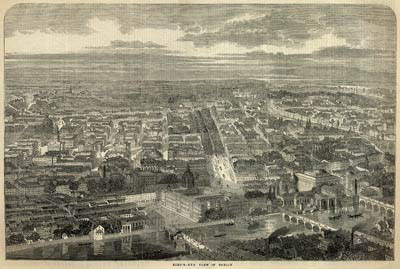
This engraving appeared in the 20 February 1858 issue of the Illustrated
London News.![]()
The history of the Berlin Opera House (also referred to as the Court opera) goes back to 1740, when shortly after his accession King Frederick the Great (1712-1786) commissioned the architect Georg Wenzeslaus von Knobelsdorff (1699-1753) to construct a new opera house in the city; it opened as the Royal Opera House on 7 December 1742 with Graun’s Caesar und Cleopatra. On 18 August 1843, not long after Berlioz’s first visit, the opera burnt down; while it was being reconstructed performances were held in the Schauspielhaus. The new opera house, fitted with gas lighting and enlarged by Carl Ferdinand Langhans the younger (1782-1869), opened on 7 December 1844 with Meyerbeer’s Ein Feldlager in Schlesien – and thus before Berlioz’s second visit.
The Court opera in Berlin came to an end at the same time as the Prussian monarchy; in November 1919 it was placed under the administration of the Ministry of Culture and renamed the Staatsoper (State Opera). It was destroyed twice by allied bombing during World War II. With the establishment of the German Democratic Republic in 1949, the administration of the opera, located in East Berlin, was placed under the Ministry of Culture of the GDR. In 1955 a new opera house, reconstructed according to the original plan of Knobelsdorff, opened on 4 September with a production of Wagner’s Die Meistersinger von Nüremberg. After the reunification of Germany in 1990 the opera was officially renamed Staatsoper Unter den Linden (Berlin State Opera under the lime-trees).
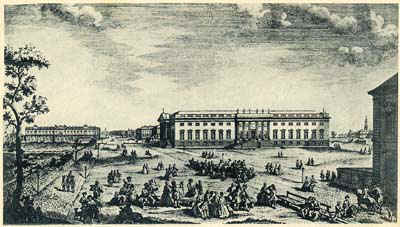
This 18th century engraving was reproduced on a 1920 postcard.
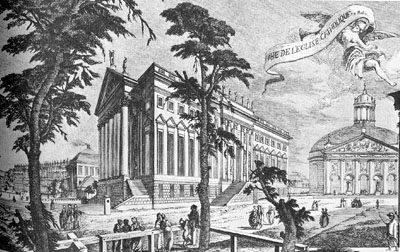
The above picture was published in The New Grove Dictionary of Music and Musicians (1980), vol. 2.
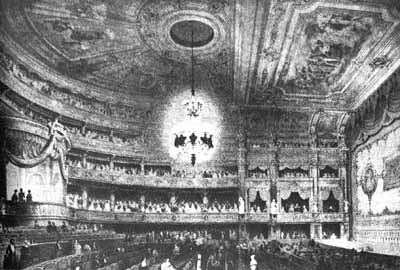
The above picture was published in The New Grove Dictionary of Music and Musicians (1980), vol. 2.
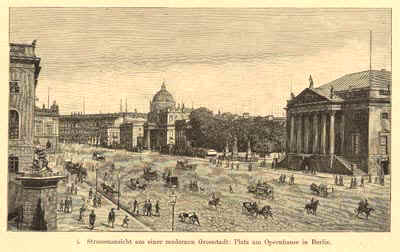
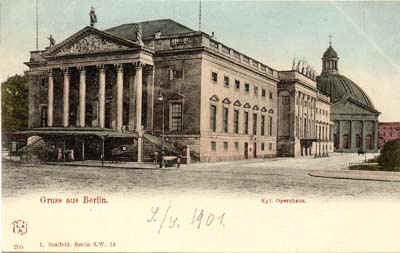
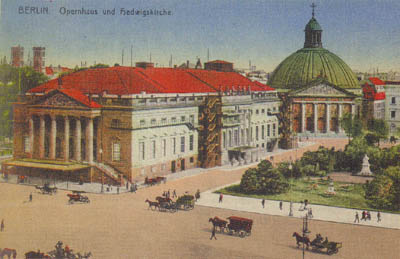
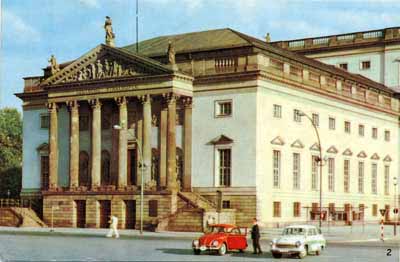
This postcard shows the Opera in East Berlin, then the capital of the German Democratic Republic.![]()
Sans-Souci is located at Potsdam, some 30 kms to the west of Berlin. It is there that Frederick the Great developed the celebrated gardens (nearly 300 ha. in extent) and its palaces: the first palace (Schloß Sanssouci), built as a summer residence for the king on the eastern side of the gardens by the architect Knobelsdorff in 1745-1747 (the same architect as for the opera house), and the New Palace (Neues Palais) on the western site, built in 1763-1769 not as a principle residence but for the reception of royal visitors and dignitaries. Other buildings were added in the 19th century. Berlioz only mentions one palace where he was entertained, presumably the Sanssouci Palace rather than the New Palace. The entire complex of gardens and palaces is now a major tourist attraction.
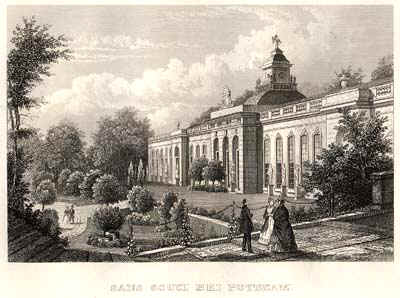
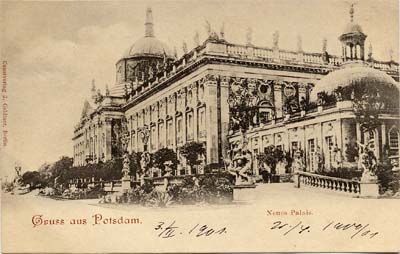
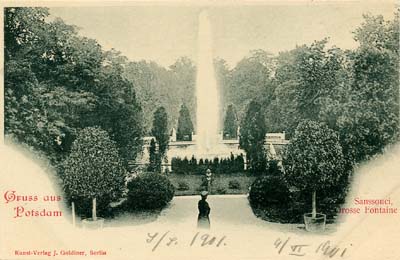
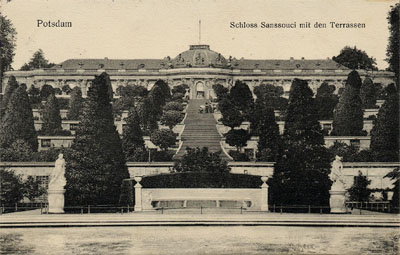
(Large view).![]()
![]()
The Hector Berlioz Website was created by Monir Tayeb and Michel Austin on 18 July 1997.
The Berlioz in Berlin page was created on 1 April 2007; updated on 1 August 2010. Revised on 1 February 2024.
© (unless otherwise stated) Michel Austin and Monir Tayeb.